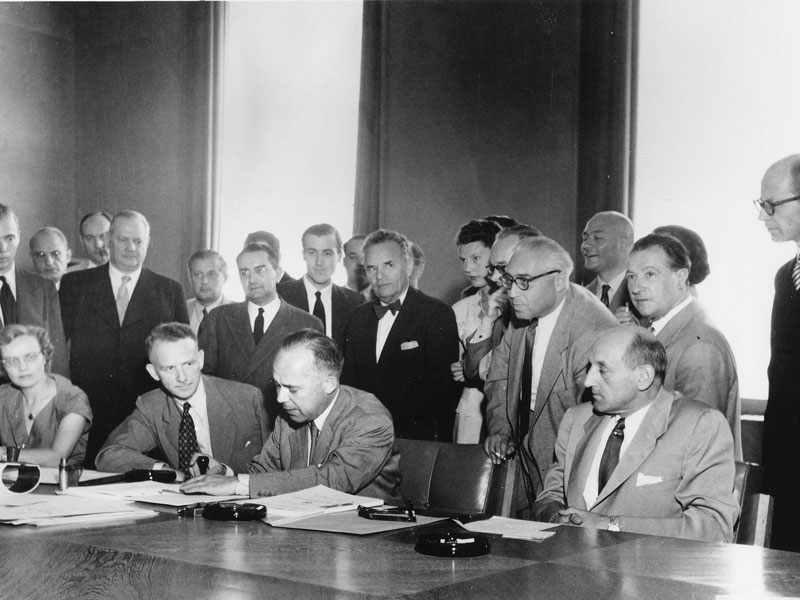The Refugee Convention at 70
By Elisha Wiesel and Mark Hetfield
Jul 30, 2021

The signing of the 1951 Refugee Convention, Geneva, Switzerland.
(UN Archives)
When Sadako Ogata was nearing her retirement as the United Nations High Commissioner for Refugees, she said that she did not want to leave a legacy, but a future. Holocaust survivor, author and scholar Elie Wiesel stated his vision differently: he wanted the UNHCR to go out of business because it would no longer be needed.
This week marks the 70th anniversary of the Refugee Convention of 1951, the international legal document which was intended to ensure solutions for refugees. UNHCR is still in business and the number of refugees continues to grow.
What does the Refugee Convention say? It can be reduced to a few basic concepts:
- A refugee is a person who fled his or her country due to a well-founded fear of persecution on account of who they are or what they believe;
- A refugee shall not be returned to his or her persecutor;
- Anyone claiming to be a refugee shall be regarded as a refugee until found to be otherwise;
- Refugees are entitled to the same human rights as you and me.
With apologies to the Jewish sage Hillel, that is the entire Refugee Convention. The rest is commentary.
The Refugee Convention was built precisely with people like Elie Wiesel and his wife Marion in mind. Her family were resettled as refugees by HIAS, the oldest refugee resettlement agency in the United States, and Elie Wiesel struggled greatly to make ends meet in his first years in the country after surviving genocide. Both were displaced in the wake of the World War II, both sought to flee persecution but were unable to because so few nations opened their doors. The spirit of the Refugee Convention was expressed by a kind immigration officer who, when Elie Wiesel appeared to renew his residence card, told him, “You know, you can just apply for citizenship, rather than keep renewing, right?”
In a 1985 essay entitled, “The Refugee,” Elie Wiesel described the “20th century invention” of the refugee in words which are, unfortunately, as timely and relevant today as when he wrote them:
I was in France for many years, always as a refugee. Only here [in the United States] did I become a citizen, and I must tell that I feel nothing but gratitude to this country, the first country that offered me a home and a refuge. I can tell you, my good friends from El Salvador, from Guatemala, and other places, that I hope you will soon feel what I feel. The twentieth century has created so many symbols, so many new concepts. It has also created a new human species: the refugee.
Now what is the characteristic of a refugee? It is that she or he has no citizenship. Hundreds of thousands, if not millions, of human beings have felt — overnight — unwanted. Now nothing can be more painful than being unwanted everywhere, undesired, and this is what a refugee is.... What I hope this century will achieve before it reaches its end is to get rid of this species. No more refugees.
Is the Refugee Convention still working today? Is it still relevant? After all, we now have 82.4 million forcibly displaced persons in the world, people who have been forced out of their homes by conflict, violence, and persecution. This is the highest number in world history.
The Refugee Convention of 1951 and its 1967 Protocol are intended to ensure that no refugee is returned to their persecutor and that their human rights will be protected, with the intention that they be refugees no more or, as Elie Wiesel said, that they become “our brothers and our sisters.”
The Refugee Convention is not failing. We are failing. The Refugee Convention is but a tool, and like any tool, it only works when applied. It is up to the international community, to each country that is a party to the convention, and to each individual, to make sure that every person who flees persecution is welcomed. Each of us needs to lead by the power of our example.
It is a shame that, on the occasion of this 70th Anniversary, and at the time of the greatest refugee crisis in history, the United States is on track this year to welcome the smallest number of refugees since Congress passed the Refugee Act of 1980. It is a shame that the United States is still invoking Title 42 – a public health law predating the Refugee Convention – to exclude nearly all asylum seekers at our borders, without screening them for fear of return.
We can and must do better.
To celebrate the 70th anniversary of the Refugee Convention, let’s ensure that our country leads by the power of example by resettling more refugees and demonstrating to the world that the United States views refugees as a blessing, not a burden. Let’s demand that asylum seekers at our borders have access to fair, efficient, and dignified asylum proceedings. Let's remember that so many of us are only alive and in this country today because the United States opened its doors for our parents and grandparents when they were fleeing for their lives.
Elisha Wiesel is the son of Marion and Elie Wiesel. Mark Hetfield is the President and CEO of HIAS, the global Jewish non-profit that protects refugees.


